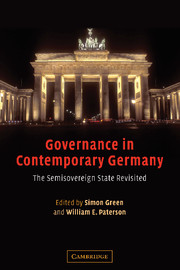Book contents
- Frontmatter
- Contents
- List of figures
- List of tables
- List of contributors
- Acknowledgments
- List of abbreviations
- 1 Introduction: Semisovereignty Challenged
- 2 Institutional Transfer: Can Semisovereignty be Transferred? The Political Economy of Eastern Germany
- 3 Political Parties
- 4 Federalism: the New Territorialism
- 5 Shock-Absorbers Under Stress: Parapublic Institutions and the Double Challenges of German Unification and European Integration
- 6 Economic Policy Management: Catastrophic Equilibrium, Tipping Points and Crisis Interventions
- 7 Industrial Relations: From State Weakness as Strength to State Weakness as Weakness. Welfare Corporatism and the Private Use of the Public Interest
- 8 Social Policy: Crisis and Transformation
- 9 Immigration and Integration Policy: Between Incrementalism and Non-decisions
- 10 Environmental Policy: the Law of Diminishing Returns?
- 11 Administrative Reform: Is Public Bureaucracy Still an Obstacle?
- 12 European Policy-making: Between Associated Sovereignty and Semisovereignty
- 13 Conclusion: Semisovereignty in United Germany
- References
- Index
10 - Environmental Policy: the Law of Diminishing Returns?
Published online by Cambridge University Press: 05 June 2012
- Frontmatter
- Contents
- List of figures
- List of tables
- List of contributors
- Acknowledgments
- List of abbreviations
- 1 Introduction: Semisovereignty Challenged
- 2 Institutional Transfer: Can Semisovereignty be Transferred? The Political Economy of Eastern Germany
- 3 Political Parties
- 4 Federalism: the New Territorialism
- 5 Shock-Absorbers Under Stress: Parapublic Institutions and the Double Challenges of German Unification and European Integration
- 6 Economic Policy Management: Catastrophic Equilibrium, Tipping Points and Crisis Interventions
- 7 Industrial Relations: From State Weakness as Strength to State Weakness as Weakness. Welfare Corporatism and the Private Use of the Public Interest
- 8 Social Policy: Crisis and Transformation
- 9 Immigration and Integration Policy: Between Incrementalism and Non-decisions
- 10 Environmental Policy: the Law of Diminishing Returns?
- 11 Administrative Reform: Is Public Bureaucracy Still an Obstacle?
- 12 European Policy-making: Between Associated Sovereignty and Semisovereignty
- 13 Conclusion: Semisovereignty in United Germany
- References
- Index
Summary
Introduction
It is interesting to note that Katzenstein's original work on the semisovereign state did not include environmental policy as one of its specific domains for analysis (Katzenstein 1987). To a certain extent this is a curious omission, given that it was precisely at that point in the late 1980s that Germany's reputation as an ‘environmental leader’ (Weale 1992a, 1992b) was at its highest and that, in this policy domain at least, the German semisovereign state's capability to manage change appeared the most pronounced. Indeed, compared with other large European states, Germany in the 1980s was highly responsive to both the real environmental challenges associated with complex industrial societies and the higher levels of public unease about the trajectory of such societies, as manifested by the discourse of the ‘new politics’ and the emergence of Green parties (Lees 2000a, 2000b). As noted in chapter 1, some of those states, such as the United Kingdom, were characterised by unitary structures. Thus, the fact that the semisovereign Federal Republic outperformed states that were assumed to possess superior steering capacities was in itself worthy of note.
In defence of the original decision to omit environmental policy, however, one might also point out that it is when one is in the midst of change that it is hardest to define its overall parameters, trajectory and long-term consequences. Almost two decades later we are better placed to enjoy the benefit of hindsight and to take the long view.
- Type
- Chapter
- Information
- Governance in Contemporary GermanyThe Semisovereign State Revisited, pp. 212 - 238Publisher: Cambridge University PressPrint publication year: 2005
- 2
- Cited by



